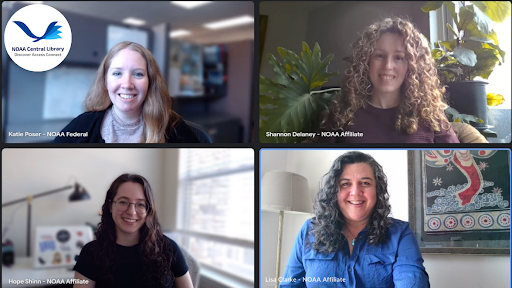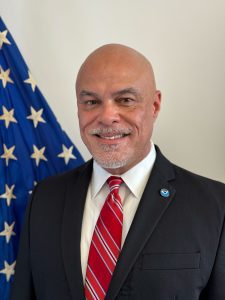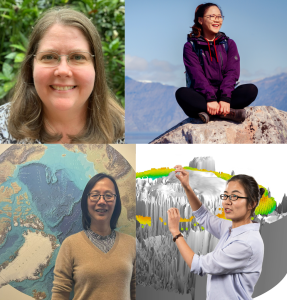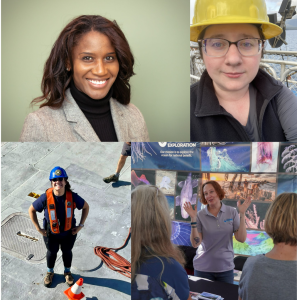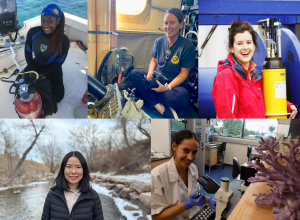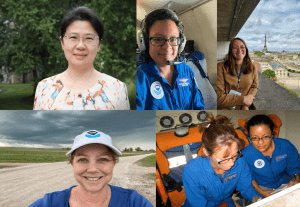To celebrate Women’s History Month, we asked women throughout NOAA Research who make lasting impacts in scientific research, leadership, and support from the field to the office to share how their work contributes to NOAA’s mission of Climate Resilience and preparing for a Climate-Ready Nation. This article highlights an interview with the NOAA Central Library Research Team, including Librarians Lisa Clarke, Hope Shinn, and Shannon Delaney, and Outreach Librarian Katie Poser.
Our conversation follows:
What projects or research are you working on now, and how does your work contribute to climate resilience?
Katie: My recent research support for the Great Lakes Aquatic Nonindigenous Species Information System (GLANSIS) focused on the invasive European Common Reed, Phragmites australis. Learning and sharing the latest literature and research on this and other species contributes to climate resilience by discovering mitigation strategies, possible benefits of non-native plants, and the overall impact on crucial ecosystems in the path of climate change. This comes home for me since I am from Michigan and on a trip home this past month I stared out the window on the drive and questioned every reed we passed!
Lisa: The library supports many of the Endangered Species Act (ESA) projects at NOAA by providing literature that helps scientists and policy makers understand the state of the species. I firmly believe in climate resilience through the preservation of all inhabitants of an ecosystem, and I think that by providing thorough literature reviews, and going down information rabbit holes (which librarians are really good at!), we are supporting informed decision-making. Currently, I’m working on finding literature on Olympic Peninsula steelhead, Oncorhynchus mykiss, to support an ESA status review. Not only am I getting literature from scientific journals, universities, and government agencies, I’m including tribal information from the region as well. NOAA wants to hear all voices, and we know where to find them.
Hope: I recently worked with a team in NOAA’s National Ocean Service that maintains the Green Infrastructure Effectiveness Database. I first worked with them back in 2021 to do a literature review on the effectiveness of green infrastructure, and created a bibliography on the impacts of green infrastructure on gentrification. This year, I updated that work by adding anything that had been published since 2021. This information will go into their database where it will hopefully be useful to communities impacted by climate change. Green infrastructure is just one aspect of climate resilience, but it can be very impactful, especially for coastal communities.
Shannon: The research team recently wrapped up a big project with NOAA's Performance, Risk, and Social Science Office where we looked at the economic and societal impacts of extreme events like marine heatwaves, tornadoes, and drought. We found publications for them and we also provided training so their team can continuously collect new research on these topics through automated searches. Right now, Hope and I are advising a NOAA Fisheries group on how to set up a shared EndNote library that will archive all the research used in their biological opinions. These two projects are great examples of how we work with teams across NOAA and help make their research processes reproducible, accessible, and sustainable. While we aren't the ones writing big reports or making major policy decisions on climate resilience, we are helping those who do.
What does climate resilience or climate-ready nation mean to you? What would you want people to know about NOAA’s work on climate resilience?
Katie: Climate resilience and climate-ready means staying educated on the science, and part of that is reading up on our research – I wish people knew that all NOAA’s published work is freely available on the NOAA Institutional Repository!
Lisa: A climate-ready nation to me is a citizenry that is informed about the science behind our climate realities. I want people to know not only that NOAA is a clearing house of science-based climate information, but that the agency encourages accessible ways for people to participate in our work, through citizen science projects, for example. I am also a big fan of NOAA’s Office of Education – I tell all my public and school librarian friends to check out their website and inspire a new generation of atmospheric and ocean scientists!
Hope: NOAA scientists and policy makers do a lot of work to balance protecting people, their livelihoods, and the environments that we live in. That work tends to only end up in the news when it’s being criticized, and I wish all of it, especially the less controversial work, was more visible. Climate resilience is about good decision-making by both governments and individuals. Individuals are better empowered to make these decisions when they have good information like that provided by NOAA.
Shannon: I agree with Hope on this. We hear a lot about climate resilience these days, but it's important to remember that the stories you hear in the news only represent a small percentage of what's happening. So much valuable work occurs behind the scenes. When you hear about a new report or program from NOAA, keep in mind that countless hours of research and preparation have gone into its creation. And if you ever want to learn more about a project, the library is a great place to start.
What gives you hope, either with regard to science, your field in NOAA, or in general?
Katie: Our NOAA scientists give me hope! They give presentations on their amazing work through the library and I learn every day something new that we are advancing – for example we hosted a seminar on the ‘America the Beautiful’ initiative and the role we have in meeting the 30×30 goal!
Lisa: As an agency, we value access to information, and I am proud of the library’s role in that through the NOAA Institutional Repository, which Katie mentioned. I am also one of the librarians that hosts webinars through our Library Seminars platform. We showcase the work coming out of NOAA through webinars, and over the last few years, I have worked with dozens of seasoned scientists and fellows who are actively working on solutions to problems caused by climate change. The problem-solving orientation of my NOAA colleagues gives me great hope. I am so honored to support their work through our library’s services.
Hope: We hear about, and often see, a lot of misinformation and disinformation on the Internet, especially when it comes to science and scientific research. What may be less eye-catching is the incredible abundance of high-quality, entertaining, and accessible science content available on practically every Internet platform. There has maybe never been another time when so much good scientific information has been available to the general public! It gives me a lot of hope to see so many people making and engaging with this kind of content. I especially want to give a shout-out to one of my favorite podcasts, Ologies, where host Alie Ward does fascinating and in-depth interviews with scientists about their specialties. Of particular interest to NOAA folks may be the episodes on Cheloniology (with NOAA’s own Dr. Camryn Allen!) and Meteorology (with former AMS president Dr. Marshall Shepherd). I know I’ve learned a lot from Ologies and the many scientists who talk about their work on the Internet, and I’m sure that’s also true for millions of people all over the world.
Shannon: There is so much momentum behind climate resilience from younger generations, and that's something I love to see. Gen Z in particular is bringing so much creativity and energy into tackling climate change. You don't need to be an experienced scientist to have great ideas and make a difference. The more we welcome younger and more diverse voices, the more we all stand to gain.
Looking back, what would you tell yourself when you were 12 years old? Or, what advice would you give to a woman who is starting her career?
Katie: I would tell myself that thinking the library was the coolest place to be, will remain true decades later! My advice for women starting their careers or restarting a new career: develop boundaries between work and your personal life (one is more important and it’s not work) and know your worth. I believe this is something that often comes with experience, but it’s never too early to recognize how valuable your perspective is and make space for yourself in any situation.
Lisa: I wanted to be a dolphin “doctor” as a kid. I excelled in biology and other sciences all the way through high school, but when I stepped into my first college science courses, I was one of only a few women, and I felt intimidated. I wish I had actively reached out to the women in science groups I now know were available at my university. So I would recommend that women scientists not be ashamed of seeking out support. Lucky for me, I found a different kind of science – library science – and it’s been very rewarding to assist the marine biology world in this role. I never would have guessed that I’d be helping dolphins as a librarian, and supporting ESA conservation efforts with literature reviews! I love being a research librarian.
Hope: I would really encourage my younger self to not let perfectionism drive my choices and interests. I avoided studying any of the sciences, even though I was interested in them, because I was terrified of not being good at them and getting bad grades. I stuck to what I knew I was good at, and it got me to being a librarian at NOAA, so I haven’t done too badly! Though I sometimes wonder where life may have led me if I hadn’t been so fearful as I was making choices about high school classes or college majors. I would emphasize to younger women that fear, particularly of failure, can be overcome and it should not keep them from doing what they are truly interested in or capable of.
Shannon: It’s okay to make mistakes and have failures! I think that's something we could all benefit from hearing regularly, and I'm grateful to have colleagues who remind me of this. Our society often puts so much pressure on girls and women to be perfect. It's really hard not to internalize this and become your own worst critic. I've found it helpful to talk about my mistakes: connecting with others when I'm struggling (and hearing about mistakes they've made!) lessens the discomfort and embarrassment, and it helps me move forward.
Special thanks to Katie Poser, Lisa Clarke, Hope Shinn, and Shannon Delaney for participating in this interview for Women’s History Month at NOAA.
